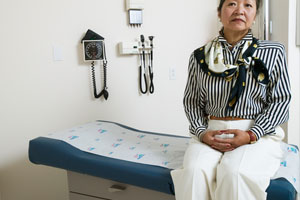US research that found terminal cancer patients often incorrectly believe that the intention of chemotherapy is curative has surprised Australian experts, who say local patients are more likely to understand the purpose of their treatment.
The research, published in the New England Journal of Medicine, found that 69% of patients with metastatic lung cancer and 81% of those with colorectal cancer did not understand that chemotherapy was unlikely to be curative. (1)
Associate Professor Gary Richardson, chairman of the Medical Oncology Group of Australia (MOGA), said the level of misunderstanding was likely to be far lower in Australia due to clinical and cultural differences between the two countries.
“Culturally, they have a lot of different views about communication both doctor-wise and patient-wise”, Professor Richardson said, adding that US medical oncologists also tended to be more “gung-ho” in their approach to treatment.
Professor Phyllis Butow, chair of the University of Sydney’s Psycho-Oncology Co-operative Research Group, was also surprised by the high levels of misunderstanding reported in the study.
She said research she and colleagues performed more than a decade ago had shown that less than 20% of Australian patients with incurable cancer did not understand that their treatment was not curative. (2)
However, Professor Butow said the problem in Australia was still significant. “Breaking bad news is an area where many clinicians struggle”, she said.
Training programs and guidelines had been shown to be effective in helping doctors to communicate these challenging issues in a way that supported patients in decision making but didn’t destroy hope, she said.
Professor Richardson said MOGA conducted communication skills workshops to equip medical oncology trainees with skills in dealing with challenging discussions with patients.
The introduction of multidisciplinary teams — including surgeons, radiotherapists, medical oncologists, psycho-oncologists, palliative care physicians and social workers — had also “improved the cancer journey” for patients and ensured all practitioners were aware of a patient’s prognosis.
“Certainly one of the most difficult communications is telling a patient that they have disease that is incurable and that they have a limited lifespan”, he said.
However, Professor Richardson said many patients also had unrealistic expectations of cure — often fuelled by mainstream media, the internet and complementary and alternative medicine practitioners — which oncologists were finding increasingly difficult to navigate.
The US researchers questioned 1193 patients who were receiving chemotherapy for newly diagnosed metastatic (stage IV) lung or colorectal cancer about their understanding of the purpose of their treatment.
“Paradoxically, patients who reported higher scores for physician communication were also at higher risk for inaccurate expectations”, the researchers wrote.
An accompanying editorial said truthful conversations that acknowledge death were welcomed by patients and helped them to understand their chances of cure. (3)
“This is not one hard conversation for which we can muster our courage but a series of conversations over time from the first existential threat to life”, the editorial said.
Professor Butow said although in the short term patients found the news difficult to hear, in the longer term it built trust between the doctor and patient.
“If patients feel they will be told the truth no matter what it is, I think over the long term it builds greater trust in the doctor–patient relationship. But initially bad news is hard to hear and I think that’s part of the discomfort clinicians have with giving clear information”, she said.
“If patients don’t understand that the aim of treatment is not necessarily cure, they can make decisions which are not in their best interests. For example, they may decide to keep going with chemotherapy when it’s not really going to help them — they don’t live any longer and their quality of life is worse.”
– Nicole MacKee
1. NEJM 2012; 367: 1616-1625
2. Annals of Oncology 1999; 10: 39-46
3. NEJM 2012: 367: 1651-1652
Posted 29 October 2012

 more_vert
more_vert